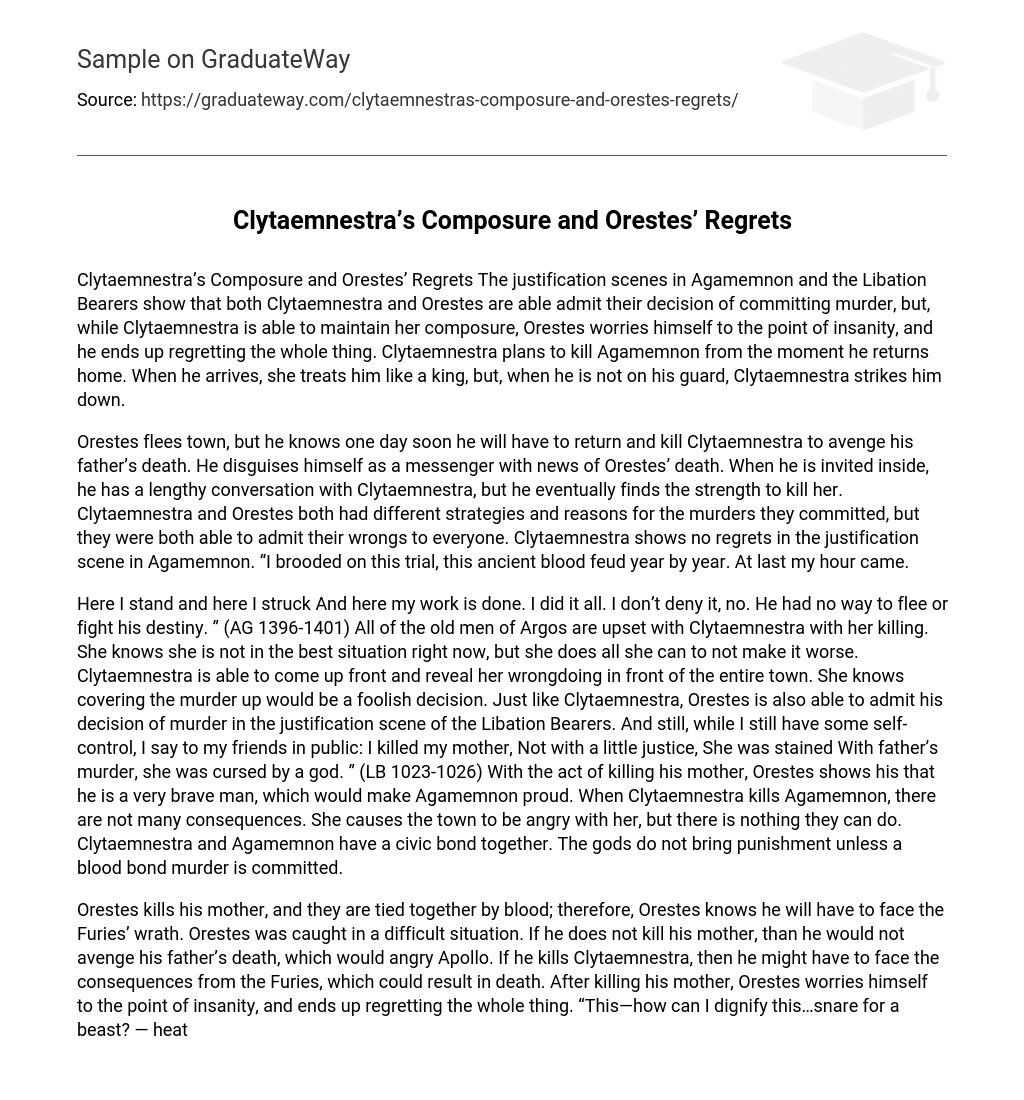Both Agamemnon and the Libation Bearers display justification scenes in which Clytaemnestra and Orestes acknowledge their choices to commit murder. However, while Clytaemnestra remains composed, Orestes becomes consumed by worry and eventually regrets his actions. Clytaemnestra is determined to kill Agamemnon as soon as he returns home. Upon his arrival, she treats him with utmost respect, but seizes the opportunity to strike him down when his guard is down.
Orestes escapes the city, aware that eventually he will need to come back and exact revenge on Clytaemnestra for his father’s murder. He adopts the guise of a messenger and brings news of Orestes’ own demise. After being welcomed into the house, he engages in a lengthy exchange with Clytaemnestra before finally summoning the courage to slay her.
Clytaemnestra and Orestes had distinct approaches and motives for the murders they carried out, yet they both had the capacity to confess their transgressions to everyone. In the justification scene in Agamemnon, Clytaemnestra displays no remorse as she reflects on the long-standing blood feud and finally seizes her moment.
Having stood here, I have delivered the final blow, fully completing my work. I acknowledge and take full responsibility for my actions without any denial. With no means to escape or challenge his fate, he was left helpless.
The act of murder committed by Clytaemnestra has angered all elderly residents of Argos (AG 1396-1401). Despite being aware of her precarious situation, she exerts every effort to avoid making it worse.
Both Clytaemnestra and Orestes demonstrate the ability to openly confess their acts of wrongdoing. Clytaemnestra understands that trying to conceal the murder would be unwise. Similarly, Orestes acknowledges his decision to commit murder during the justification scene of the Libation Bearers. Despite maintaining some self-control, Orestes publicly declares to his friends: “I killed my mother, Not with a little justice, She was stained With father’s murder, she was cursed by a god.” (LB 1023-1026)
Orestes demonstrates his bravery by killing his mother, which would make Agamemnon proud. Clytaemnestra’s act of killing Agamemnon, although it angers the town, does not result in severe consequences since there is no recourse for the townspeople. Clytaemnestra and Agamemnon share a civic bond, and the gods only bring punishment in cases of murder within a blood bond.
Orestes murders his mother, and their shared blood creates an unbreakable bond, leading Orestes to anticipate the wrath of the Furies. Orestes found himself in a predicament. If he refrains from killing his mother, he would fail to seek vengeance for his father’s death, thus incurring Apollo’s anger. On the other hand, murdering Clytaemnestra subjects him to potential retribution from the Furies, which could culminate in his demise. Subsequent to his matricide, Orestes spirals into a state of madness, consumed by regret over his actions. In his profound anguish, he reflects, “This… how can I dignify this… trap for a beast?… place for a corpse’s feet? This winding-sheet… This bath of death! No, a hunting net… A coiling—what shall I name it?… Foot-trap woven of robes…” (LB 990-994)
When Orestes delivers this speech, he repeatedly glances at his mother’s lifeless body, contemplating how he could have committed matricide. However, he acknowledges that there is no way to undo it. His words become disjointed and his sentences remain unfinished. Orestes is oblivious to the meaning of what he is saying; he simply spews out words. At a later point in his speech, Orestes displays further signs of uncertainty, stating, “I must escape this blood…it is my own. — I must turn towards his hearth, none but his, the Prophet God decreed.” (LB 1036-1038)
Orestes looks at his hand tightly holding the sword and talks to his mother for a long time before killing her. Clytaemnestra almost convinces Orestes to spare her, but Pylades gives a short empowering speech that strengthens his determination. Orestes stares at his still mother and grip, regretting his wish to undo everything. He understands that only a miracle can save him from death now.
Although Orestes had the opportunity to have a fulfilling life with his mother, he laments not choosing that path and postponing his quest for revenge against his father’s murderer. Unfortunately, it is now impossible to alter his course of action. Both Clytaemnestra and Orestes have committed killings, but their experiences and consequences vary significantly. Clytaemnestra can live without remorse or any divine consequences, whereas Orestes profoundly regrets his deeds and must confront the imminent danger posed by the Furies.





